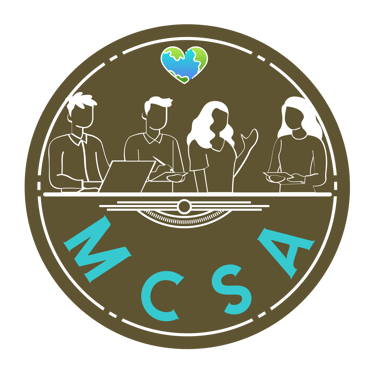
Our Mission
MCSA's mission is to empower and enrich the scientific processes by promoting the active participation of migrants in citizen science. We aim to provide a platform for collaboration between academic and field experts with non-academic scientists/citizens to generate collective knowledge from communities where migrants live, and in some instances, even in their countries of origin. Our organization is dedicated to providing training and education for citizen scientists, facilitating communication and discussions, and promoting an atmosphere of openness and respect to encourage the inclusion of diverse people.
Our Vision
MCSA envisions citizen science as a tool to critically rethink social structures, worldviews, and knowledge production through the active participation of migrants, including women and gender minorities. We aim to challenge biases rooted in Eurocentric, androcentric, and Western-centered perspectives shaped by historic privilege.
Our vision is an inclusive, diverse scientific community where migrants are empowered contributors to knowledge, fostering a more just, equitable, and gender-responsive society. We promote openness, respect, and collaboration across all communities traditionally excluded from science.
MCSA Core Values
1
2
Empowerment
Empowerment in citizen science refers to the process of enabling marginalized individuals specifically migrants to actively participate in scientific research and decision-making, by recognizing their agency and providing them with the necessary skills, knowledge, and resources to take action and make informed choices.
Fairness
Fairness in citizen science can be objectively defined as ensuring that all individuals and communities have equal opportunities and access to participate in scientific activities, as well as equal representation and recognition of their contributions regardless of their personal characteristics or circumstances.
3
4




Humility
Humility in the context of citizen science refers to the willingness of individuals and organizations to recognize and value the diverse perspectives and knowledge of all researchers and participants, including migrants, in collaborative, evidence-based, and nature-based scientific activities and practices.
5
7
Integration
Integration in citizen science refers to the involvement and collaboration of diverse communities, including migrants, in scientific research and decision-making processes, toward knowledge generation.
6
Diversity & Inclusivity
Diversity and inclusivity in citizen science refer to the active involvement and representation of individuals from various backgrounds such as migrants, as the inclusion of diverse perspectives and experiences can lead to a more comprehensive and accurate understanding of scientific issues.


MCSA’s success as an NGO depends on core values that guide its work toward sustainability and effective communication. Empowerment, respect, and fairness ensure our mission drives positive change for migrants and society. Honesty and integrity build trust with stakeholders, while integration embeds our values into all processes.
Humility helps us recognize our limits and the importance of collaboration to achieve shared goals. Diversity and inclusivity ensure diverse voices shape decisions and solutions, fostering sustainable, community-driven outcomes
Respect
Respect, in the context of citizen science, refers to treating all researchers (including citizen scientists) and participants, regardless of their background, with dignity, fairness, and cultural sensitivity, while acknowledging and upholding their rights as individuals.
Honesty & Integrity
Honesty in citizen science refers to the act of accurately reporting and disclosing any conflicts of interest, while integrity involves adhering to high ethical standards throughout the scientific process, including data collection, analysis, and reporting, to ensure the credibility and reliability of the scientific results.
8
Empathy
Empathy in citizen science embodies the fundamental principle of stepping into the shoes of others. Citizen scientists, who double as both researchers and active contributors, deserve not only recognition for their invaluable input but also the utmost sensitivity in their engagement. Their dedication and passion for advancing scientific knowledge should be met with appreciation and respect, fostering a collaborative and inclusive environment where their diverse perspectives can thrive.
M C S A Goals & objectives
1. Advancing Participatory Research Among Migrant Communities
MCSA supports the meaningful engagement of migrants in all phases of scientific inquiry, particularly on issues that affect their everyday lives. This includes not only the provision of tools and training, but also the recognition of lived experience as a valid and essential source of knowledge. Participation is encouraged in a way that acknowledges structural inequalities and actively mitigates them through inclusive and accessible practices.
2. Strengthening Representation and Structural Inclusion in Science
Through strategic partnerships and outreach, MCSA promotes increased visibility and participation of migrants in scientific fields. We work to create interdisciplinary and cross-sectoral spaces where knowledge can be exchanged on equal terms, and where decision-making is informed by a plurality of voices. Representation is not treated as symbolic, but as integral to institutional change within science and policy.
3. Developing Inclusive Knowledge Ecosystems
We are building a transnational network of citizen scientists, institutions, and community actors to address complex challenges affecting migrant communities. These collaborations are structured to promote inclusive methodologies and ethical engagement, ensuring that gender, cultural background, and social position are considered throughout research design, data interpretation, and dissemination.
4. Promoting Recognition of Migrant Contributions to Science and Society
Public engagement is a cornerstone of MCSA’s work. We aim to shift dominant narratives by showcasing the scientific, social, and cultural contributions of migrants. Our communication strategies foreground the value of inclusive science and encourage respectful dialogue across difference, while addressing systemic barriers to participation—including those based on gender and social status.
5. Supporting Community-Led Research and Capacity Building
MCSA enables migrants to lead their own citizen science initiatives by offering tailored support in project development, data analysis, and knowledge dissemination. This work is rooted in a commitment to equity and sustainability, with a focus on access to resources, fair representation in leadership, and the cultivation of inclusive learning environments.
6. Contributing to a More Just and Inclusive Scientific Framework in Europe
We engage with broader European networks to promote a citizen science model that reflects the diversity of its constituents. MCSA contributes to shaping frameworks where community-based knowledge is legitimized, and participatory science is structurally supported. Our involvement is grounded in principles of social justice, inclusion, and gender-aware governance.
7. Embedding Migrant Perspectives in Public Dialogue and Policy
We facilitate opportunities for migrants to participate in public dialogue and policy consultation, ensuring that their perspectives inform both scientific inquiry and institutional practices. This includes the integration of critical reflections on identity, power, and marginality, and advocates for more accountable and responsive systems.
8. Fostering Intersectoral Collaboration for Equitable Research Practices
Our partnerships with universities, NGOs, and community organizations are grounded in shared responsibility for ethical, inclusive research. These collaborations prioritize equitable distribution of roles, decision-making power, and recognition, while supporting the integration of gender perspectives into both research content and institutional structures.
9. Generating Evidence to Inform Inclusive Policy and Practice
Through empirical research and continuous monitoring, MCSA examines the lived experiences of migrants in science and society. These insights inform the development of targeted strategies to reduce structural barriers, including those related to gender, and help establish institutional mechanisms that support inclusive participation.
10. Advocating for Sustainable and Equitable Research Infrastructures
We engage with funders and policymakers to promote long-term support for citizen science initiatives rooted in equity, inclusion, and social relevance. Our advocacy underscores the need for structural commitments—such as fair funding allocation, safe environments, and attention to work-life balance—that enable sustained engagement across diverse groups.


The Migrants' Citizen Science Association (MCSA) pursues an inclusive approach to citizen science that centers the experiences and contributions of migrants in the co-production of knowledge. Our work seeks to transform the relationship between science and society by creating participatory pathways for those traditionally underrepresented in research and decision-making processes.

